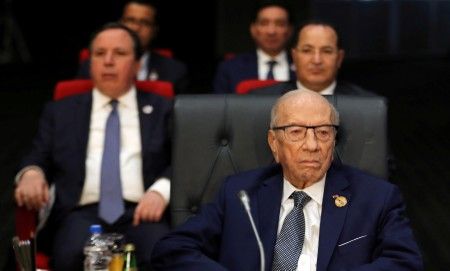
TUNIS (Reuters) – Tunisian President Beji Caid Essebsi, who helped shape his country’s democratic transition after a 2011 revolution ended decades of authoritarian rule, has died, the presidency said on Thursday. He was 92.
One of the world’s oldest leaders, Essebsi was taken to a military hospital on Wednesday. Essebsi had been hospitalized late last month and spent a week in hospital after suffering what authorities described as a severe health crisis.
Drafted in as prime minister in 2011 after veteran autocrat Zine al-Abidine Ben Ali was toppled, Essebsi was elected president three years later, becoming the country’s first directly elected head of state after its “Arab Spring” uprising.
He co-brokered a historic power-sharing deal between his Nidaa Tounes movement and Islamist party Ennahda that helped to steady the country, but the tie-up later frayed and Nidaa Tounes fractured into political infighting centring on Essebsi’s son Hafedh Caid Essebsi, who became party leader.
Though Tunisia remained a democratic exception in a troubled region, critics accused Essebsi of attempting a dynastic handover, rowing back on post-revolution freedoms, and failing to support a truth commission seeking justice for the victims of authoritarian rule.
Born in 1926, Essebsi grew up under French rule and served in various positions after independence in 1956 under Habib Bourguiba, the modern state’s founding father, rising to the post of foreign minister by the 1980s.
Under Ben Ali, who removed the ailing Bourguiba on health grounds in 1987, he was briefly speaker of parliament but spent long periods outside politics, going back to his old job as a lawyer as hopes that Ben Ali would ease the autocratic grip prevailing under Bourguiba faded.
HELPED DRAFT DEMOCRATIC CONSTITUTION
Essebsi returned to the political scene after Ben Ali fled with his family to Saudi Arabia amid mass protests in 2011 and Tunisia became the first country to unseat its leader in uprisings that swept the region.
He helped draft a new democratic constitution guaranteeing fundamental rights such as freedom of speech, and preparing Tunisia for free elections.
In 2012, he founded the Nidaa Tounes to counter the Islamists of Ennahda, whose return to politics after Ben Ali’s fall and victory in 2011 elections sparked deep angst and protests among its secular-leaning opponents and Tunisia’s Europeanized elite.
Political polarization deepened with the 2013 assassination of two leftist opposition leaders Chokri Belaid and Mohamed Brahmi, which were blamed on radical Islamists.
Essebsi, together with labor unions, business leaders and civil society groups, reached an agreement with Ennahda to form a power-sharing government, working together for a constitution that was approved in 2014.
The agreement stabilized the country as other parts of the region such as Syria, Yemen or Libya struggled with upheaval and violence. In recognition of their role, Tunisian civil society groups won the Nobel Peace Prize in 2015.
In the 2014 parliamentary elections, Essebsi led his party to victory and became the first directly elected president after the revolution. Despite his party’s win, he formed a coalition government with Ennahda, favoring consensus after several years of post-uprising turmoil.
WOMEN
As president, Essebsi followed his mentor Bourguiba in promoting a secular state, promising to use education to lift the fortunes of the country’s impoverished interior and winning regional recognition for promoting women’s rights.
Since Bourguiba, Tunisia has granted women more rights than other countries in North Africa and the Middle East, and since 2017 has allowed Muslim women to marry non-Muslim men.
However, Essebsi was unable to achieve his stated goal of equality of inheritance between women and men, a taboo in the region, leaving the door open for exceptions in the face of opposition from Islamists.
In recent years, Essebsi faced growing criticism over the role of his son, with divisions in Nidaa Tounes distracting from work on much needed economic reforms.
Essebsi denied dynastic maneuvering, saying his son had the right to practice politics and that he could not dismiss him.
Essebsi also faced criticism that he was seeking a return to a strong state with power concentrated in the presidency, whose role is limited to foreign and defense policies under the new constitution.
Editing by Aidan Lewis, William Maclean


